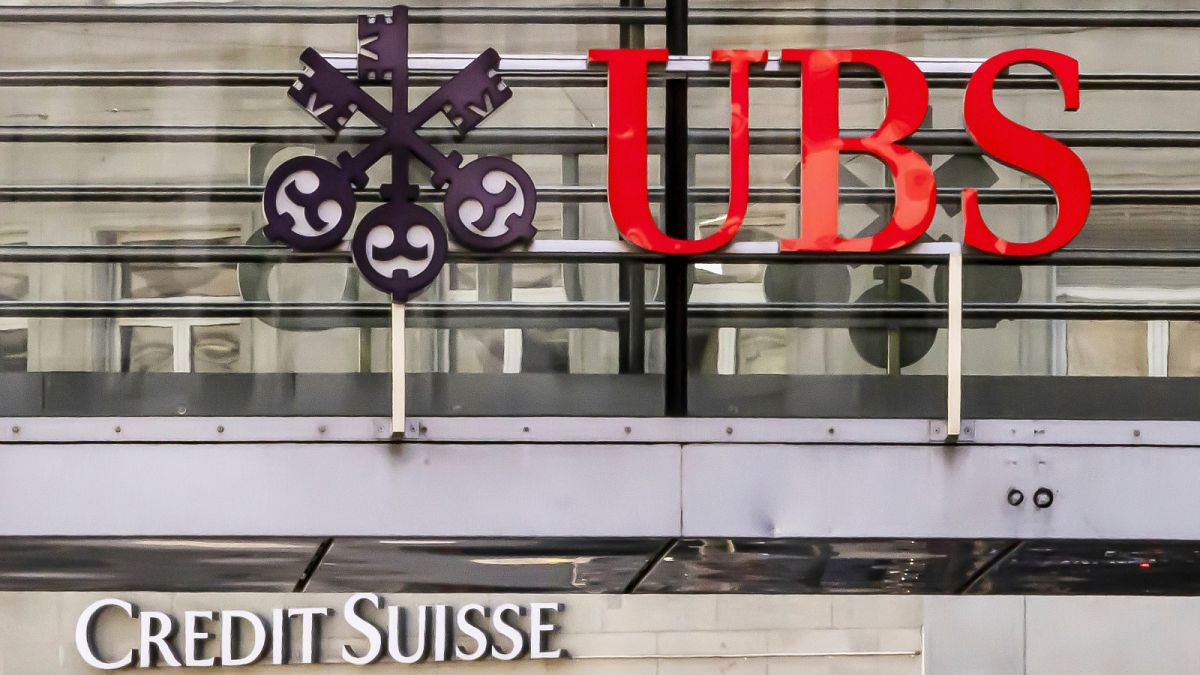The Swiss central bank is extending a line of credit up to CHF 100 billion (€100 billion) to UBS and Credit Suisse.
Banking giant UBS is to acquire its smaller rival Credit Suisse for $3.25 billion (€3.05 billion euros), in an effort to avoid further market-shaking turmoil in global banking.
The announcement came at a news conference Sunday evening, where the Federal Council, Switzerland's seven-member governing body that includes President Alain Berset, said this was the best solution to restore confidence.
Swiss authorities pushed for UBS to take over its smaller rival after a plan for Credit Suisse to borrow up to 50 billion francs ($54 billion) failed to reassure investors.
The Swiss central bank is extending a line of credit up to CHF 100 billion (€100 billion) to UBS and Credit Suisse.
In a press release, the Swiss National Bank said "with the takeover of Credit Suisse by UBS, a solution has been found to secure financial stability and protect the Swiss economy in this exceptional situation."
Credit Suisse is designated by the Financial Stability Board, an international body that monitors the global financial system, as one of the world’s globally systemic important banks. This means regulators believe its uncontrolled failure would lead to ripples throughout the financial system not unlike the collapse of Lehman Brothers 15 years ago.
Sunday's news conference follows the collapse of two large US banks last week that spurred a frantic, broad response from the US government to prevent any further bank panics. Still, global financial markets have been on edge since Credit Suisse's share price began plummeting this week.
The 167-year-old Credit Suisse already received a $50 billion (€46.5 billion) loan from the Swiss National Bank, which briefly caused a rally in the bank's stock price. Yet the move did not appear to be enough to stem an outflow of deposits, according to news reports.
Still, many of Credit Suisse’s problems are unique and do not overlap with the weaknesses that brought down Silicon Valley Bank and Signature Bank, whose failures led to a significant rescue effort by the Federal Deposit Insurance Corporation and the Federal Reserve. As a result, their downfall does not necessarily signal the start of a financial crisis similar to what occurred in 2008.
Sunday evening's news conference capped a highly volatile week for Credit Suisse, most notably on Wednesday when its shares plunged to a record low after its largest investor, the Saudi National Bank, said it wouldn't invest any more money into the bank to avoid tripping regulations that would kick in if its stake rose about 10%.
On Friday, shares dropped 8% to close at CHF 1.86 francs (euros) on the Swiss exchange. The stock has seen a long downward slide: It traded at more than CHF 80 francs (euros) in 2007.
Its current troubles began after Credit Suisse reported on Tuesday that managers had identified “material weaknesses” in the bank’s internal controls on financial reporting as of the end of last year. That fanned fears that Credit Suisse would be the next domino to fall.
While smaller than its Swiss rival UBS, Credit Suisse still wields considerable influence, with $1.4 trillion (€1.3 trillion) assets under management. The firm has significant trading desks around the world, caters to the rich and wealthy through its wealth management business, and is a major advisor for global companies in mergers and acquisitions. Notably, Credit Suisse did not need government assistance in 2008 during the financial crisis, while UBS did.
In the wake of reforms enacted after the 2008 financial crisis, Credit Suisse is also among the 30 financial institutions known as globally systemically important banks, which have stricter scrutiny and higher capital requirements.
